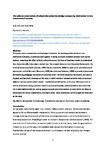The cultural construction of subject discipline knowledge: comparing ‘abstraction’ in two international contexts
| dc.contributor.author | Pratt, Nicholas | |
| dc.contributor.author | Kelly, Peter | |
| dc.date.accessioned | 2017-01-06T23:49:26Z | |
| dc.date.available | 2017-01-06T23:49:26Z | |
| dc.date.issued | 2016-12-01 | |
| dc.identifier.issn | 1745-4999 | |
| dc.identifier.issn | 1745-4999 | |
| dc.identifier.uri | http://hdl.handle.net/10026.1/8219 | |
| dc.description.abstract |
<jats:p>This paper uses a comparative methodology to examine the teaching of abstraction in two mathematics lessons, in Denmark and England. In doing so it aims to extend previous work by the authors, examining the effect of local, cultural issues on the form of teaching in order to understand how these also affect the subject content too. The analysis draws on two theoretical frameworks: the work of Hazzan and Zazkis to make sense of mathematical abstraction; and of Bernstein to provide a framework for examining pedagogic discourses at classroom level. The work compares two lessons, one each in England and Denmark, drawing out the ways in which teachers’ situated activities help to construct different versions of the subject matter – mathematical abstraction in this case. We assert that as well as abstraction being a practice which is constructed socially, cultural practices also mean that this is done differentially for, and by, groups of pupils and their teachers in ways which are likely to exacerbate the former’s differences, not reduce them. Some implications of this insight are discussed at the close.</jats:p> | |
| dc.format.extent | 434-448 | |
| dc.language | en | |
| dc.language.iso | en | |
| dc.publisher | SAGE Publications | |
| dc.title | The cultural construction of subject discipline knowledge: comparing ‘abstraction’ in two international contexts | |
| dc.type | journal-article | |
| dc.type | Journal Article | |
| plymouth.issue | 4 | |
| plymouth.volume | 11 | |
| plymouth.publication-status | Published | |
| plymouth.journal | Research in Comparative and International Education | |
| dc.identifier.doi | 10.1177/1745499916682660 | |
| plymouth.organisational-group | /Plymouth | |
| plymouth.organisational-group | /Plymouth/Faculty of Arts, Humanities and Business | |
| plymouth.organisational-group | /Plymouth/Faculty of Arts, Humanities and Business/Plymouth Institute of Education | |
| plymouth.organisational-group | /Plymouth/REF 2021 Researchers by UoA | |
| plymouth.organisational-group | /Plymouth/REF 2021 Researchers by UoA/UoA23 Education | |
| plymouth.organisational-group | /Plymouth/Research Groups | |
| plymouth.organisational-group | /Plymouth/Research Groups/Institute of Health and Community | |
| plymouth.organisational-group | /Plymouth/Users by role | |
| plymouth.organisational-group | /Plymouth/Users by role/Academics | |
| dcterms.dateAccepted | 2016-10-30 | |
| dc.identifier.eissn | 1745-4999 | |
| dc.rights.embargoperiod | No embargo | |
| rioxxterms.versionofrecord | 10.1177/1745499916682660 | |
| rioxxterms.licenseref.uri | http://www.rioxx.net/licenses/all-rights-reserved | |
| rioxxterms.licenseref.startdate | 2016-12-01 | |
| rioxxterms.type | Journal Article/Review |


